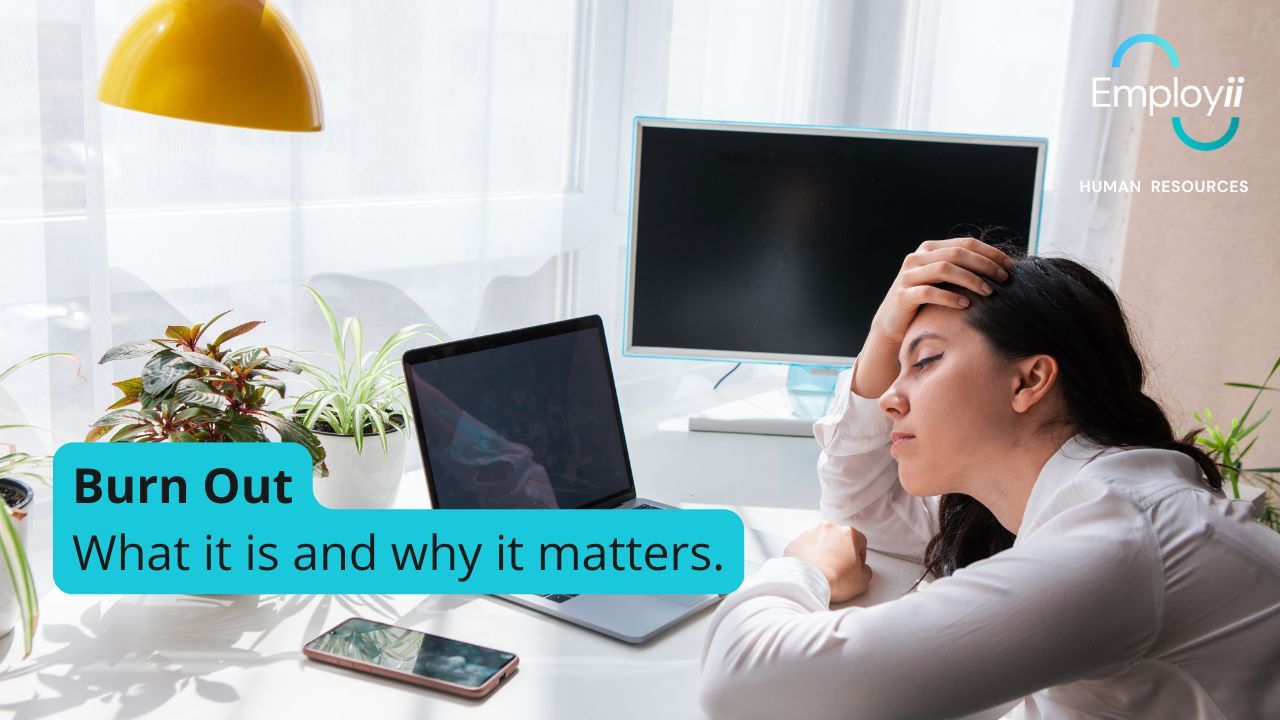
Signs of Burn Out
Oct 23, 2025Recently, our HR Consultant Jess attended a Wellbeing Seminar hosted by The Resilience Project. It delved into stress and burn out in the workplace, an important topic to not only understand but also mindfully manage for ourselves and those around us.
Here's what she learnt...!
What is stress?
Our bodies are designed to be able to have short bursts of energy to meet the physical demands of certain situations. The rise in heart rate and breathing rate can help us overcome circumstances, but is only designed to happen in short bursts. When we're sitting in the stress response too long, with no time to recover, it impacts how we respond to the world.
What is burn out?
Burn out isn't just fatigue, it's an experience that undermines how we perform.
The three main facets of burn out are:
- Depletion – being emotionally and physically exhausted, no amount of rest takes this away.
- Disconnect and cynicism – having an increased feeling of negativity and a desire to move away and not want to engage anymore.
- Reduced personal effectiveness – shows up as things like “what’s the point”, “I’m not making a difference”
So what puts us at risk? We all respond to situations differently. Whether it's a high pressure environment or situational changes, no two people are entirely alike. There are certain risk factors that remain common across the board, such as:
- An excessive and unrelenting workload.
- Low support and feelings of loneliness, even in leadership positions feeling segregated and isolated from the rest of the team you manage.
- Efforts not being noticed with no feedback or a sense of gratitude and appreciation.
- Holding unrelenting standards for yourself & constantly striving for perfectionism.
- Experiences of inequality and discrimination or bullying and harassment.
Why does burn out matter, and what should leaders look out for?
Burn out isn't just a buzz phrase, it's something that can heavily impact our personal and work lives. In a work setting, it compromises someone's ability to perform which can lead to low productivity, less meaningful and effective work, and high staff turnover.
It's important for a leader to be aware of the key signs, but also for us to know what to look out for in ourselves. We can't always recognise when we're burnt out, but a self check in goes a long way to managing issues before they grow. The key signs are:
- Performance dropping off.
- Increased absenteeism.
- Feeling more reactive
- Snapping, immediately shutting down, being defensive to feedback.
- How can we slow the reactivity down to find a way to respond rather than react.
- Feeling more sensitive to the feedback someone’s receiving and not being able to see a bigger picture.
- The urge to shut down – e.g wanting to go home and have a drink, lay down, scroll on your phone.
How can we handle burn out?
As great as quitting our jobs and moving to Bali sounds, there are other (and less drastic) ways to handle the burn out in our lives.
Businesses can look into:
- Upskilling leaders to ensure they're equipped with an understanding of what psychosocial risks and hazards include, how to handle them, and their responsibilities as an organisation.
- Understanding the mental health continuum and how people fluctuate.
- Training leaders on GEM (gratitude, empathy and mindfulness) so our leaders have strategies to be those people for the employees
- Measure issues through employee engagement surveys
In moments of stress, individuals can:
- Be willing to tune into what’s happening for you and have awareness of the early warning signs, for example, irritability, sensitivity, changes in sleep, changes in appetite, withdrawing socially, avoidance tendencies, engagement issues.
- Practice mindfulness.
- Exercise, even just going for a walk can help.
- Focus on breath work.
- Remember that your leave is there to be taken, and that breaks are important. Even just having a long weekend, stepping away from your desk from five minutes, or a lunch time walk can help with preventing burn out.
- Know when to ask for help or say "no" when needed (and appropriate) to avoid over-working.
What steps to take next?
Burn out can be a sensitive topic to broach. Don't feel you need to be fully transparent with your entire team, but letting your manager know what's going on can aid in formulating the next steps. The conversation doesn't need to be a formal sit down meeting either, if it's more comfortable to send an email, or discuss over a casual coffee, these are appropriate ways to address.
It's important to know when we're going through stress and burn out, we don't always feel comfortable bringing other people in and avoidance itself is a sign things aren't going well. For managers, pending how significant the level of concern is, contacting the next of kin to check how things are going can also be an appropriate step.
If you're experiencing burn out and unsure how to address, or wanting more advice on how to start the conversation, we're here to help. Contact us at [email protected] to start the conversation.
Authored by RG (Employii Human Resources)

